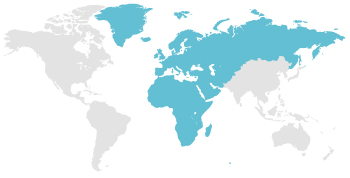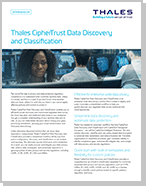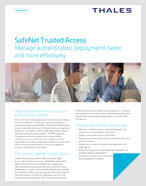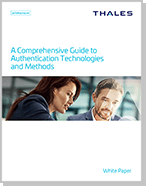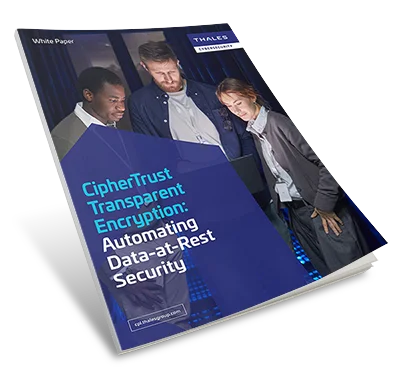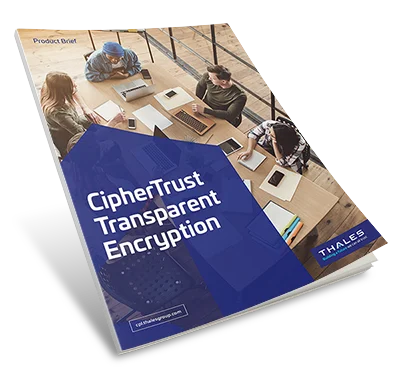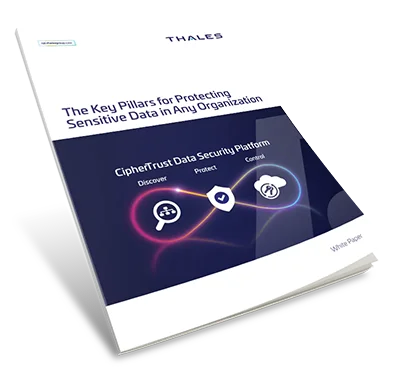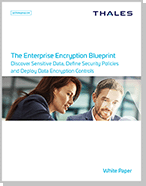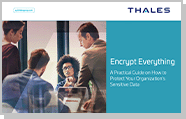Compliance Summary
DEF STAN 05-138, which specifies the measures that defence suppliers are required to achieve at each of the five levels of cyber risk that a contract can be assessed as carrying, includes several controls specific to the protection of sensitive information, as outlined below.
Thales provides data security solutions that help address these controls, as indicated. Note that while the controls are defined based on the risks associated with the contract (Low, Medium or High), Thales’s solutions apply across similar controls simultaneously and are therefore consolidated below.
Control Measures
L.07 Define and implement a policy to control access to information and information processing facilities.
M.06 Ensure the organisation has identified asset owners and asset owners control access to their assets.
L.12 Define and implement a policy to manage the access rights of user accounts.
Thales Solutions
Thales has a comprehensive set of solutions that can help organisations prepare for and comply with DEFCON 658 across all areas where data needs to be protected -- at rest, in motion and in use, including:
- Sensitive Data Discovery and Classification
- Access management and authentication
- Encryption of data-at-rest and data-in-motion
- Certified protection of encryption keys
- Tokenisation with dynamic data masking
Sensitive Data Discovery and Classification
The first step in protecting sensitive data is finding the data wherever it is in the organisation, classifying it as sensitive and typing it (e.g. PII, financial, IP, HHI, customer-confidential, etc.) so you can apply the most appropriate data protection techniques. It is also important to monitor and assess data regularly to ensure new data isn’t overlooked and your organisation does not fall out of compliance.
Thales’s CipherTrust Data Discovery and Classification efficiently identifies structured as well as unstructured sensitive data on-premises and in the cloud. Supporting both agentless and agent-based deployment models, the solution provides built-in templates that enable rapid identification of regulated data, highlight security risks and help you uncover compliance gaps. A streamlined workflow exposes security blind spots and reduces remediation time. Detailed reporting supports compliance programs and facilitates executive communication.
Protection of sensitive data at rest
Separation of privileged access users and sensitive user data
With the CipherTrust Data Security Platform, administrators can create a strong separation of duties between privileged administrators and data owners. CipherTrust Transparent Encryption encrypts files, while leaving their metadata in the clear. In this way, IT administrators – including hypervisor, cloud, storage and server administrators – can perform their system administration tasks, without being able to gain privileged access to the sensitive data residing on the systems they manage.
Separation of administrative duties
Strong separation of duties policies can be enforced to ensure one administrator does not have complete control over data security activities, encryption keys or administration. In addition, the CipherTrust Manager supports two-factor authentication for administrative access.
Granular privileged access controls
The CipherTrust Data Security Platform can enforce very granular, least-privileged-user access management policies, enabling protection of data from misuse by privileged users and APT attacks. Granular privileged-user-access management policies can be applied by user, process, file type, time of day and other parameters. Enforcement options can control not only permission to access clear-text data, but what file-system commands are available to a user.
Strong access management and authentication
Thales Access Management and Authentication Solutions provide both the security mechanisms and reporting capabilities organisations need to comply with data security regulations. Our solutions protect sensitive data by enforcing the appropriate access controls when users log into applications that store sensitive data. By supporting a broad range of authentication methods and policy-driven role-based access, our solutions help enterprises mitigate the risk of data breach due to compromised or stolen credentials or through insider credential abuse.
Support for smart single sign on and step-up authentication allows organisations to optimise convenience for end users, ensuring they only have to authenticate when needed. Extensive reporting allows businesses to produce a detailed audit trail of all access and authentication events, ensuring they can prove compliance with a broad range of regulations.
Control Measures
L.10 Define and implement an information security policy, related processes and procedures.
M.04 Define and implement a policy for storing, accessing and handling sensitive information securely.
Thales Solutions
Detailed Security Policies. The CipherTrust Data Security Platform delivers centralised controls that enable consistent and repeatable management of encryption, access policies and security intelligence for all your structured and unstructured data. It is available as FIPS 140-2 and Common Criteria certified virtual and physical appliances.
Extensibility. Built on an extensible infrastructure, components of the CipherTrust Data Security Platform can be deployed individually, while offering efficient, centralised key and policy management.
Robust Security for Sensitive Data. Thales helps protect sensitive data through CipherTrust Transparent Encryption with integrated Key Management for data at rest, Application Data Protection and Tokenisation with Dynamic Masking. These techniques make the data meaningless and worthless without the keys to decrypt it.
Control Measures
L.16 Define and implement an incident management policy, which must include detection, resolution and recovery.
Thales Solutions
Security Intelligence. The CipherTrust Data Security Platform provides Security Intelligence logs that specify which processes and users have accessed protected data, under which policies and if access requests were allowed or denied. The management logs will even expose when a privileged user submits a command such as ‘switch users’ to imitate and potentially exploit, the credentials of another user. Sharing these logs with a security information and event management (SIEM) platform helps uncover anomalous patterns in processes and user access, which can prompt further investigation. For example, an administrator or process may suddenly access much larger volumes of data than normal or attempt to do an unauthorised download of files. These events could point to an APT attack or malicious insider activities.
Control Measures
M.16 Define and implement a policy to secure organisational assets when individuals cease to be employed by your organisation.
Thales Solutions
Privileged Access Controls and Intelligence Logs. The CipherTrust Data Security Platform’s granular access management policies can be applied by user and access can be revoked for individuals who have left the organisation. Any denied attempts to access sensitive data will be captured by CipherTrust’s Security Intelligence logs.

